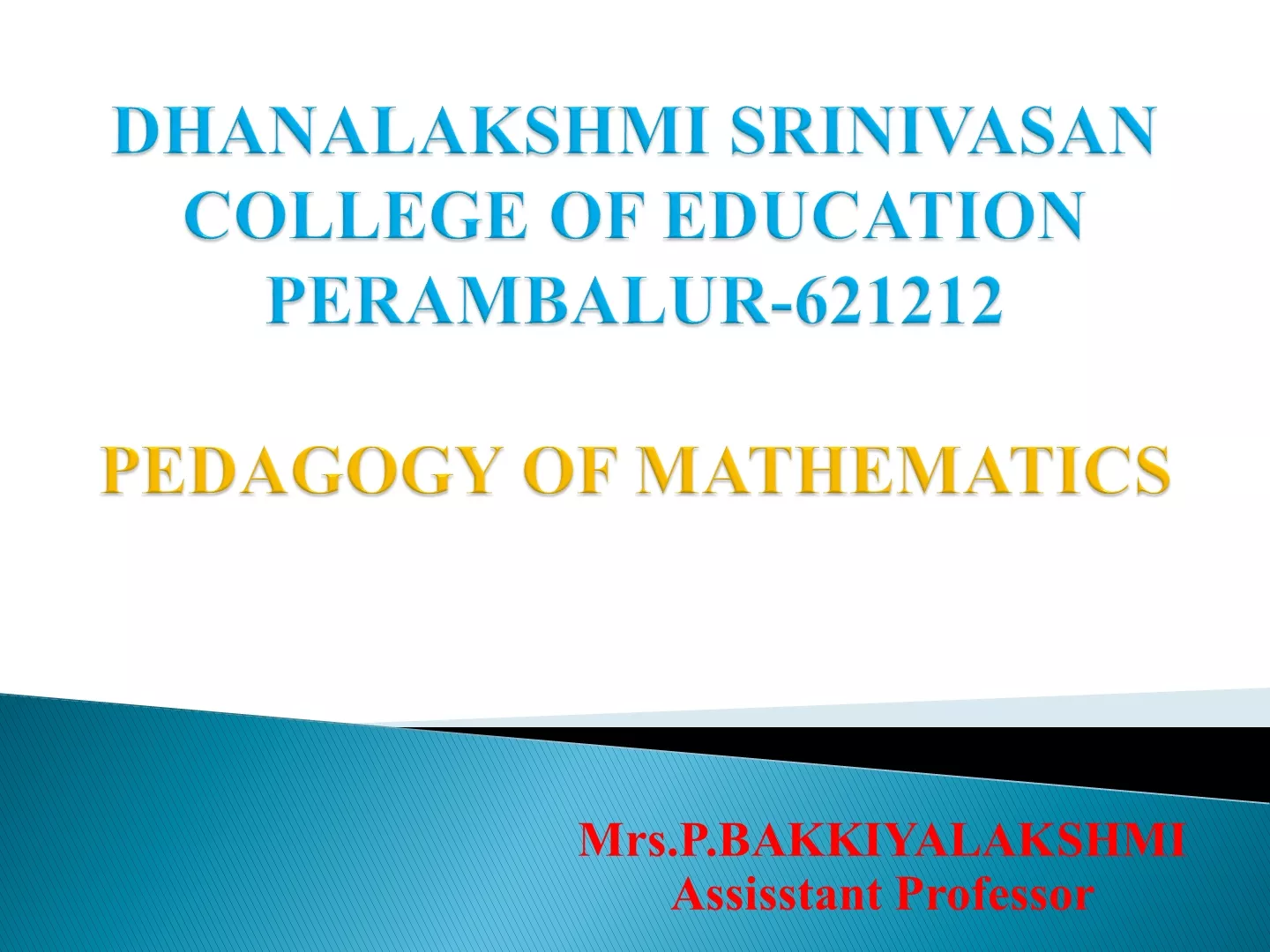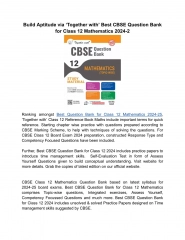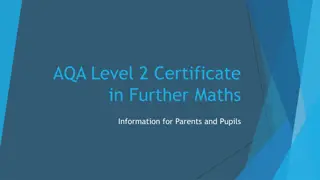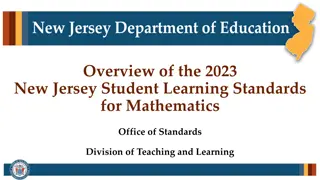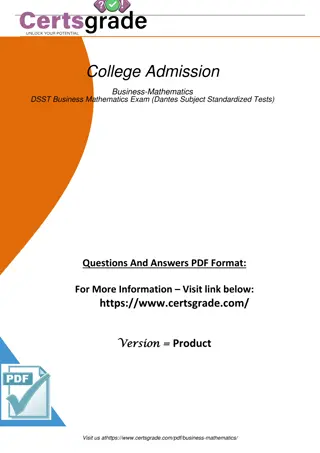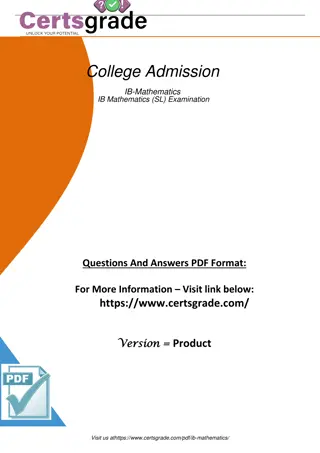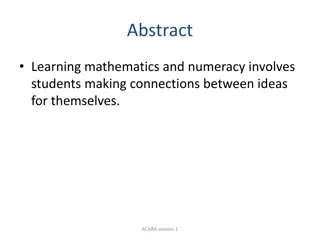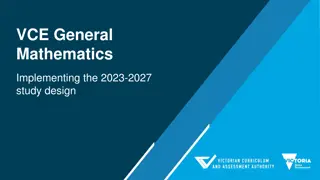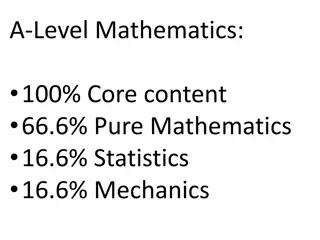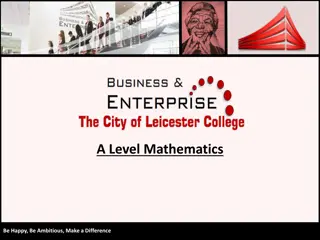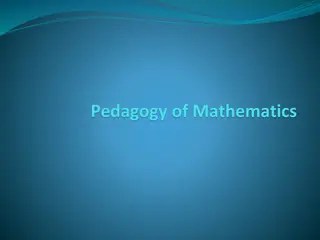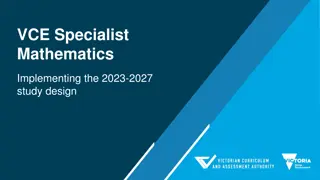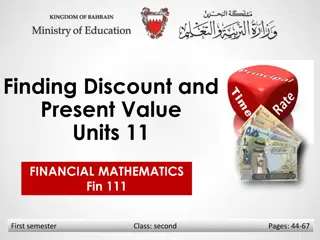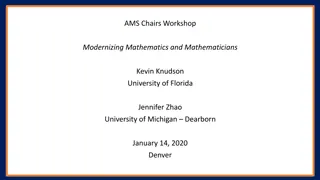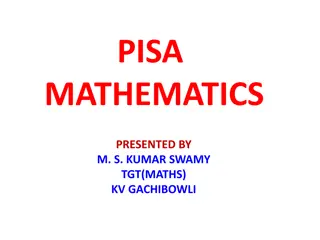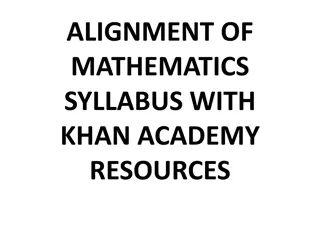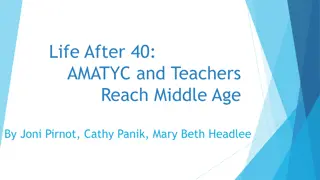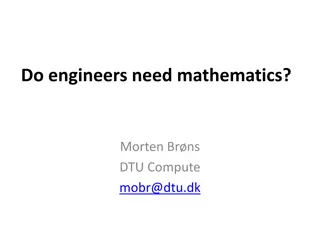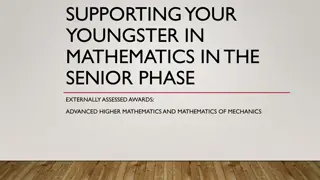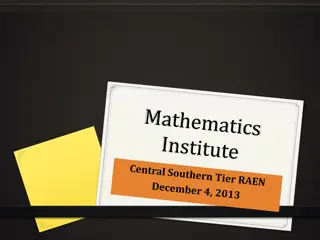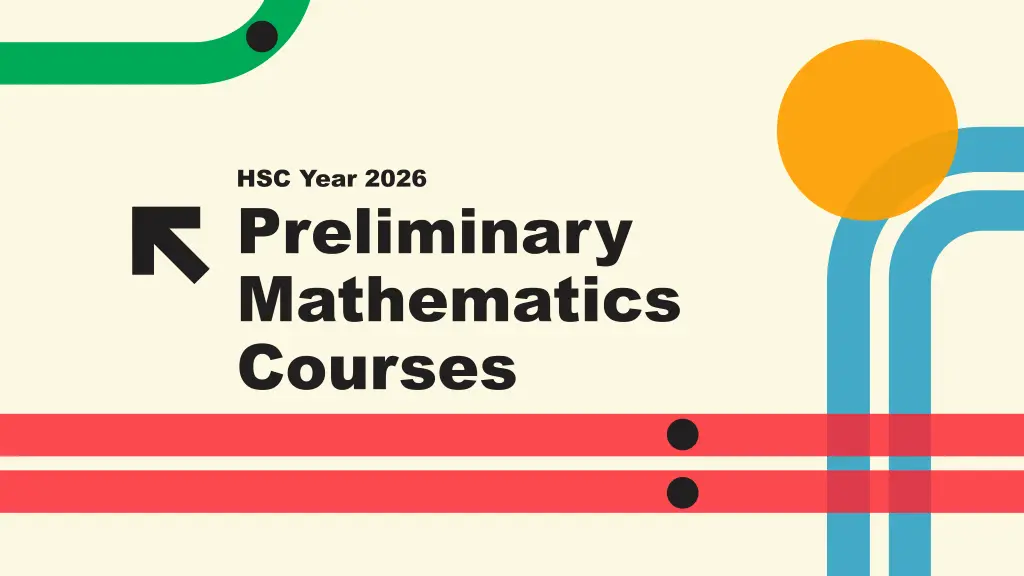
Mathematics Advanced Course Overview for HSC Year 2026
Explore the Mathematics Advanced course offerings for the HSC Year 2026 Preliminary Mathematics Courses. Delve into topics such as Functions, Trigonometry, Calculus, Exponential and Logarithmic Functions, and Statistical Analysis. Get insights into the expectations in class and support available for students. Prepare yourself for a calculus-based exploration of mathematics concepts with Mr. Lockrey guiding the learning journey.
Download Presentation

Please find below an Image/Link to download the presentation.
The content on the website is provided AS IS for your information and personal use only. It may not be sold, licensed, or shared on other websites without obtaining consent from the author. If you encounter any issues during the download, it is possible that the publisher has removed the file from their server.
You are allowed to download the files provided on this website for personal or commercial use, subject to the condition that they are used lawfully. All files are the property of their respective owners.
The content on the website is provided AS IS for your information and personal use only. It may not be sold, licensed, or shared on other websites without obtaining consent from the author.
E N D
Presentation Transcript
HSC Year 2026 Preliminary Mathematics Courses
Mathematics Courses Advanced: 11MAA1 Standard: 11MAS21, 11MAS22, 11MAS11 Numeracy: 11NU1 Click on the course graphic below for more information Advanced 2 15 15 15 Standard 1 & 2 7 Numeracy
Mathematics Advanced Mr. Lockrey
Mathematics Advanced A The Mathematics Advanced course is a calculus-based course focused on developing student awareness of mathematics as a unique and powerful way of viewing the world to investigate order, relation, pattern, uncertainty and generality. The course provides students with the opportunity to develop ways of thinking in which problems are explored through observation, reflection and reasoning. All students studying the Mathematics Advanced course will sit for an HSC examination. The Mathematics Advanced Year 11 course content comprises five Topics, each divided into Subtopics. Topic: Functions Working with Functions Topic: Trigonometric Functions Trigonometry and Measure of Angles, and Trigonometric Functions and Identities Topic: Calculus Introduction to Differentiation Topic: Exponential and Logarithmic Functions Logarithms and Exponentials Topic: Statistical Analysis Probability and Discrete Probability Distributions Mr. Lockrey
Mathematics Advanced A The Mathematics Advanced Year 11 course has been developed on the assumption that students have studied the content and achieved the outcomes of the Mathematics Years 7 10 Syllabus and in particular, the content and outcomes of all substrands of Stage 5.1 and Stage 5.2, and the following substrands of Stage 5.3: Algebraic techniques Equations Trigonometry and Pythagoras theorem and at least some of the content from the following substrands of Stage 5.3: Properties of Geometrical Shapes. Surds and indices Linear relationships Single variable data analysis Non-linear relationships Mr. Lockrey
Mathematics Advanced A Note that this means if your child has any concerns regarding their ability with any of these Year 10 topics: Algebraic techniques Equations Trigonometry and Pythagoras theorem Non-linear relationships Surds and indices Linear relationships Single variable data analysis Properties of Geometrical Shapes It is essential that they speak with Mr Lockrey to develop a plan to alleviate these concerns. One option could be attending Maths Club to fill any knowledge gaps. Maths Club runs on Thursday afternoons each week (excluding the first and last weeks) Mr. Lockrey
Mathematics Advanced A EXPECTATIONS IN CLASS Each lesson, at least one concept will be discussed, demonstrated and practiced. Each Maths class has a Team and OneNote that should be accessed regularly. We expect that each student: 1. Follows along with the explanation 2. Attempts examples together during class discussions 3. Starts the practice task (this is often a textbook exercise, but may be a digital task, such as MathsOnline or a graphing website) Students should also ensure that they: Clarify their understanding through questions It is important students can identify where they got lost during an example. This is a skill that requires practice, and students should never be embarrassed to clarify! Have a well-organised workbook whether it is digital or hard copy. Note that there is extensive mathematical notation used, so a digital workbook may be more difficult to maintain. Mr. Lockrey
Mathematics Advanced A EXPECTATIONS OUTSIDE OF CLASS While we almost never set a full exercise of practice work, students will often be required to either complete work outside of class time and review their work regularly. Ideally: After each Maths lesson, complete tasks and/ or quick review of past coursework Once a week, spend at least half an hour reviewing past coursework with study notes, flash cards, etc. Regular practice with HSC type examination questions. The Advanced course is a highly rigorous course and will need some time spent on it outside of school hours, especially if any knowledge gaps persist from Years 10. Work will be regularly checked by Mr Lockrey, and students should be prepared to show completed work each lesson. Mr. Lockrey
Thank you For any further enquiries, please contact the school on (02) 9670 6700 and ask to speak with staff from the Mathematics Faculty. END END
Mrs OConnor Mathematics Standard Mrs Tasir Mrs Dunn
Mathematics Standard S The Mathematics Standard courses allow students to develop the skills to use mathematics to make informed decisions in their daily lives. Students develop understanding and competence in mathematics through real-world applications. These skills can be used in a range of concurrent HSC subjects. All Standard students complete the same coursework in Year 11. The Mathematics Standard Year 11 course content comprises four Topics, with the Topics divided into Subtopics: Topic: Algebra - Formulae and Equations, Linear Relationships, Topic: Measurement - Applications of Measurement, Working with Time, Topic: Financial Mathematics - Money Matters Topic: Statistical Analysis - Data Analysis, Relative Frequency and Probability Mrs O Connor In Mathematics Standard 2 (Year 12 only) students extend their mathematical skills beyond Stage 5 without the in-depth knowledge of higher mathematics that the study of calculus would provide. This course prepares students for a wide range of educational and employment aspirations, including continuing their studies at a tertiary level. All students studying the Mathematics Standard 2 course must complete the HSC examination. Mathematics Standard 1 (Year 12 only) improves numeracy by building student confidence and making mathematics meaningful. Numerate students can manage situations or solve problems in everyday life, work or further learning. Mrs Tasir All students studying the Mathematics Standard 1 course have an optional HSC examination. Mrs Dunn
Mathematics Standard S The Mathematics Standard 2 Year 11 course has been developed on the assumption that students have studied the content and achieved the outcomes of the Mathematics Years 7 10 Syllabus and, in particular, the content and outcomes of all substrands of Stage 5.1 and the following substrands of Stage 5.2: Area and surface area Linear relationships Right-angled triangles (Trigonometry) Volume Financial mathematics Non-linear relationships Single variable data analysis Mrs O Connor As well as some of the content from the following substrands of Stage 5.2: Equations Probability. Mrs Tasir Mrs Dunn
Mathematics Standard S Note that this means if your child has any concerns regarding their ability with any of these Year 10 topics: Financial mathematics Non-linear relationships Single variable data analysis Equations Area and surface area Linear relationships Right-angled triangles (Trigonometry) Volume Probability Mrs O Connor It is essential that they speak with their teacher to develop a plan to alleviate these concerns. One option could be attending Maths Club to fill any knowledge gaps. Mrs Tasir Maths Club runs on Thursday afternoons each week (excluding the first and last weeks) Mrs Dunn
Mathematics Standard S EXPECTATIONS IN CLASS Each lesson, at least one concept will be discussed, demonstrated and practiced. Each Maths class has a Team and OneNote that should be accessed regularly. We expect that each student: 1. Follows along with the explanation 2. Attempts examples together during class discussions 3. Starts the practice task (this is often a textbook exercise, but may be a digital task, such as MathsOnline or a graphing website) Mrs O Connor Students should also ensure that they: Clarify their understanding through questions It is important students can identify where they got lost during an example. This is a skill that requires practice, and students should never be embarrassed to clarify! Have a well-organised workbook whether it is digital or hard copy. Note that there is some mathematical notation used, so a digital workbook may be more difficult to maintain. Mrs Tasir Mrs Dunn
Mathematics Standard S EXPECTATIONS OUTSIDE OF CLASS While we almost never set a full exercise of practice work, students will often be required to either complete work outside of class time and review their work regularly. Ideally: After each Maths lesson, complete tasks and/ or quick review of past coursework Once a week, spend at least half an hour reviewing past coursework with study notes, flash cards, etc. Regular practice with HSC type examination questions. Mrs O Connor The Standard courses are rigorous and will need some time spent on it outside of school hours, especially if any knowledge gaps persist from Years 10. Work will be regularly checked by Mrs O Connor, Mrs Tasir and Mrs Dunn and students should be prepared to show completed work each lesson. Mrs Tasir Mrs Dunn
Thank you For any further enquiries, please contact the school on (02) 9670 6700 and ask to speak with staff from the Mathematics Faculty. END END
Numeracy Miss Rasmussen
Numeracy N The Numeracy course builds on the knowledge, skills and understanding presented in the K 10 curriculum. It supports students to develop the functional numeracy skills required to become active and successful participants in society. The Numeracy Stage 6 CEC Syllabus is designed to offer opportunities for students to reason numerically and think mathematically. Numerical reasoning and mathematical thinking are supported by an atmosphere of questioning, communicating, reasoning and reflecting and are engendered by opportunities to generalise, challenge, find connections and to think critically and creatively. The Numeracy course provides opportunities for students to develop 21st-century knowledge, skills, understanding, values and attitudes. As part of this, students are encouraged to learn to use appropriate technology as an effective support for numerical and mathematical activities. Miss Rasmussen
Numeracy N The study of Numeracy in Stage 6 enables students to build on existing numeracy skills and to develop and improve their capability to: interpret and use numerical information solve problems using visual, spatial, financial and statistical literacy skills think mathematically in practical situations represent and communicate information use the context to determine the reasonableness of solutions The course is designed to develop these skills to manage situations and solve problems relating to their present and future needs. The Numeracy Year 11 course content comprises 2 modules. The modules are divided into content areas. Module 1: 1: Whole numbers 2: Operations with whole numbers 3: Distance, area and volume 4: Time 5: Data, graphs and tables Module 2: 1: Fractions and decimals 2: Operations with fractions and decimals 3: Metric relationships 4: Length, mass and capacity 5: Chance Miss Rasmussen
Numeracy N EXPECTATIONS IN CLASS Each lesson, at least one concept will be discussed, demonstrated and practiced. Each Maths class has a Team and OneNote that should be accessed regularly. Numeracy classes work almost exclusively in OneNote and will need to regularly submit work here and in Teams. Note that the Numeracy course allows for more practical work and students are expected to also participate in these tasks. We expect that each student: 1. Follows along with the introduction to the task 2. Attempts examples together and participates during class discussions 3. Starts the practice task (this is often a problem to be solved, and will mostly be digital tasks, such as MathsOnline or other websites) Students should also ensure that they: Clarify their understanding through questions Have a well-organised OneNote. Any hard copy work must also be uploaded to the appropriate location. Think about how they are thinking they will need to develop the skill of explaining their understanding. Miss Rasmussen
Numeracy N EXPECTATIONS OUTSIDE OF CLASS Students who are working well in class will have minimal work to complete outside of class. However, there will be lessons where they will need to ensure tasks are finished by the due date (Sunday of any given week at 6 pm). Tasks will be regularly checked by Miss Rasmussen and marked off on Sundays. If work remains incomplete, students will need to remain behind during a break to finish up these tasks. Miss Rasmussen
Thank you For any further enquiries, please contact the school on (02) 9670 6700 and ask to speak with staff from the Mathematics Faculty. END END

